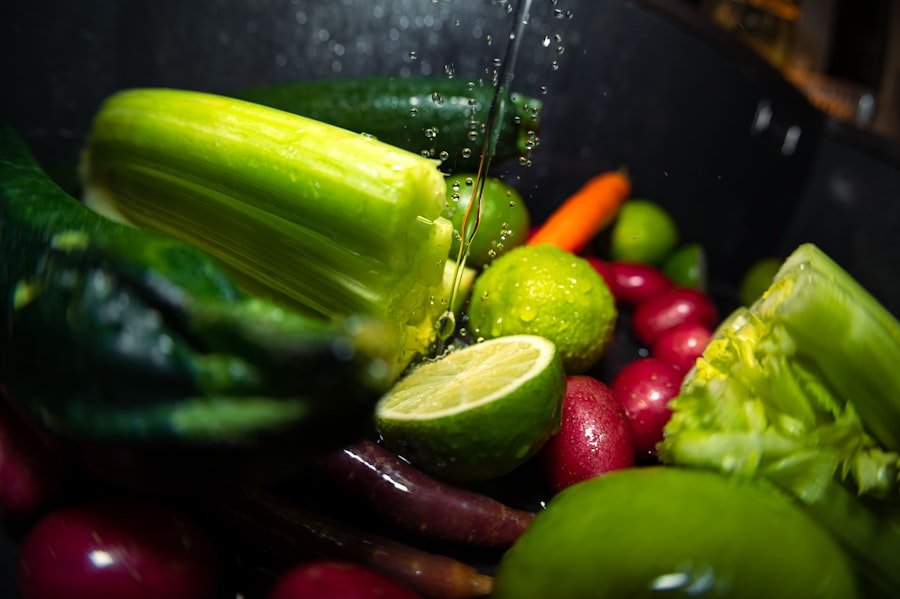This post may contain affiliate links. When you purchase through links on our site, we may earn an affiliate commission.
Fermented foods have been a part of human diets for thousands of years, serving not only as a means of preservation but also as a source of unique flavors and textures. The process of fermentation involves the conversion of sugars and starches into alcohol or organic acids by microorganisms such as bacteria, yeast, and molds. This natural process not only enhances the taste of food but also alters its nutritional profile, making it more beneficial for our health.
As I delve deeper into the world of fermented foods, I find it fascinating how this ancient practice has evolved and adapted over time, becoming a staple in various cultures around the globe. The science behind fermentation is equally intriguing. During fermentation, beneficial bacteria proliferate, creating a symbiotic environment that can lead to the production of probiotics—live microorganisms that can confer health benefits when consumed in adequate amounts.
This transformation not only preserves food but also enriches it with vitamins, minerals, and enzymes that can aid digestion and bolster the immune system. As I explore the myriad ways fermentation can enhance our food, I am continually amazed by its potential to improve our overall well-being.
Key Takeaways
- Fermented foods are produced through the process of lacto-fermentation, which involves natural bacteria feeding on the sugar and starch in the food, creating lactic acid.
- Fermented foods can improve gut health by promoting the growth of beneficial bacteria, aiding in digestion, and boosting the immune system.
- Common types of fermented foods include yogurt, kefir, sauerkraut, kimchi, kombucha, and miso.
- You can easily incorporate fermented foods into your diet by adding them to meals, snacks, and drinks, or by using them as condiments.
- Making your own fermented foods at home can be a fun and cost-effective way to ensure the quality and freshness of the ingredients, but it’s important to follow proper safety guidelines to avoid contamination.
The Benefits of Fermented Foods for Gut Health
One of the most compelling reasons to include fermented foods in my diet is their profound impact on gut health. The gut microbiome, a complex community of trillions of microorganisms residing in our digestive tract, plays a crucial role in our overall health. Research has shown that a diverse and balanced gut microbiome is essential for proper digestion, nutrient absorption, and immune function.
Fermented foods are rich in probiotics, which can help restore and maintain this delicate balance. By consuming these foods regularly, I can support my gut health and potentially ward off various digestive issues. Moreover, the benefits of fermented foods extend beyond just gut health.
They can also enhance the bioavailability of nutrients in the foods I consume. For instance, fermentation can break down anti-nutrients like phytic acid found in grains and legumes, making essential minerals more accessible to my body. Additionally, fermented foods often contain prebiotics—non-digestible fibers that feed beneficial gut bacteria—further promoting a healthy microbiome.
As I incorporate more fermented foods into my meals, I feel empowered by the knowledge that I am actively supporting my digestive health.
Types of Fermented Foods

The world of fermented foods is vast and diverse, offering a plethora of options to suit various tastes and preferences. Some of the most popular fermented foods include yogurt, kefir, sauerkraut, kimchi, miso, and tempeh. Each of these foods boasts its own unique flavor profile and health benefits.
For instance, yogurt is well-known for its creamy texture and probiotic content, while kimchi offers a spicy kick along with its beneficial bacteria. As I explore these different types of fermented foods, I find it exciting to discover new flavors and textures that can elevate my meals. In addition to traditional fermented foods, there are also innovative products emerging on the market that cater to modern dietary preferences.
For example, plant-based yogurts made from almond or coconut milk are gaining popularity among those who are lactose intolerant or following a vegan lifestyle. Similarly, kombucha—a fizzy tea beverage fermented with a symbiotic culture of bacteria and yeast—has become a trendy option for those seeking a refreshing drink with probiotic benefits. The variety available allows me to experiment with different flavors and find what resonates with my palate while reaping the health benefits associated with fermentation.
How to Incorporate Fermented Foods into Your Diet
| Fermented Food | Benefits |
|---|---|
| Yogurt | Rich in probiotics, calcium, and protein |
| Kimchi | Contains probiotics and is high in vitamins A and C |
| Kombucha | Probiotic-rich and may aid in digestion |
| Miso | Good source of probiotics and may support immune health |
| Sauerkraut | High in probiotics and may improve digestive health |
Incorporating fermented foods into my diet can be both enjoyable and straightforward. One of the easiest ways to start is by adding yogurt or kefir to my breakfast routine. I often blend them into smoothies or enjoy them with fresh fruit and granola for a nutritious start to my day.
Additionally, I find that using fermented condiments like sauerkraut or kimchi as toppings for sandwiches or salads adds a delightful crunch and tangy flavor that elevates my meals. Another approach I take is to experiment with different recipes that feature fermented ingredients. For instance, I love making stir-fries with tempeh or miso paste for added depth of flavor and nutrition.
I also enjoy baking with sourdough bread, which not only has a unique taste but also offers the benefits of fermentation. By being creative in the kitchen and trying out new dishes that incorporate fermented foods, I can easily enhance my diet while enjoying the process.
Making Your Own Fermented Foods at Home
One of the most rewarding aspects of exploring fermented foods is the opportunity to make them at home. The process of fermenting my own foods allows me to connect with the tradition of fermentation while also customizing flavors to suit my preferences. Starting with simple recipes like sauerkraut or pickles has been an enjoyable experience for me.
All it takes is some fresh vegetables, salt, and time for the magic of fermentation to occur. As I delve deeper into home fermentation, I’ve discovered that making yogurt or kefir is also quite accessible. With just a few ingredients and some patience, I can create creamy, probiotic-rich dairy products right in my kitchen.
The satisfaction of seeing my homemade creations come to life is incredibly fulfilling. Plus, it gives me control over the ingredients used, ensuring that I’m consuming high-quality products without any unnecessary additives.
Potential Risks and Precautions of Consuming Fermented Foods

While fermented foods offer numerous health benefits, it’s essential to be aware of potential risks associated with their consumption. For instance, individuals with compromised immune systems or certain medical conditions may need to exercise caution when introducing probiotics into their diets. It’s crucial for me to consult with a healthcare professional if I have any underlying health concerns before making significant changes to my diet.
Additionally, not all fermented foods are created equal. Some commercially available products may contain added sugars or preservatives that can diminish their health benefits. As I navigate the world of fermented foods, I make it a point to read labels carefully and choose products that are minimally processed and free from artificial ingredients.
By being mindful of what I consume, I can enjoy the advantages of fermentation while minimizing any potential risks.
Fermented Foods and Digestive Disorders
For those suffering from digestive disorders such as irritable bowel syndrome (IBS) or inflammatory bowel disease (IBD), incorporating fermented foods into their diets may offer relief. Research suggests that probiotics found in fermented foods can help alleviate symptoms associated with these conditions by promoting a healthier gut microbiome. As someone who values holistic approaches to health, I find it encouraging that natural food sources can play a role in managing digestive issues.
However, it’s important to note that individual responses to fermented foods can vary widely. While some people may experience significant improvements in their symptoms after adding probiotics to their diets, others may find that certain fermented foods exacerbate their discomfort. This variability underscores the importance of listening to my body and keeping track of how different foods affect my digestive health.
By doing so, I can tailor my diet to best support my individual needs.
The Future of Fermented Foods in Gut Health Research
As research into gut health continues to evolve, the future of fermented foods looks promising. Scientists are increasingly recognizing the importance of the gut microbiome in overall health and well-being, leading to a surge in studies exploring the relationship between fermented foods and various health outcomes. As I follow these developments closely, I am excited about the potential discoveries that may further illuminate how fermentation can benefit our bodies.
Moreover, advancements in technology are enabling researchers to delve deeper into the complexities of the microbiome and its interactions with different dietary components. This could lead to more personalized nutrition recommendations based on individual microbiome profiles, allowing me to optimize my diet for better health outcomes. As we continue to uncover the mysteries of gut health through research, I remain optimistic about the role that fermented foods will play in shaping our understanding of nutrition and wellness in the years to come.
In conclusion, my journey into the world of fermented foods has been enlightening and rewarding. From understanding their historical significance to exploring their myriad benefits for gut health, I have come to appreciate these culinary treasures deeply. By incorporating a variety of fermented foods into my diet and even experimenting with making them at home, I feel empowered to take charge of my health while enjoying delicious flavors along the way.
As research continues to unfold in this exciting field, I look forward to discovering even more about how these ancient practices can enhance modern living.
If you’re interested in learning more about gut health and the benefits of fermented foods, be sure to check out the article on A to Z Cozy Corner. This article dives into the importance of maintaining a healthy gut microbiome and how fermented foods can help support digestive health. It’s a great resource for anyone looking to improve their overall wellness through diet and nutrition.
FAQs
What is gut health?
Gut health refers to the balance and function of the microorganisms that reside in the digestive tract. A healthy gut is important for overall well-being and can impact digestion, immune function, and even mental health.
What are fermented foods?
Fermented foods are foods that have been through a process of lactofermentation in which natural bacteria feed on the sugar and starch in the food, creating lactic acid. This process preserves the food, and creates beneficial enzymes, b-vitamins, Omega-3 fatty acids, and various strains of probiotics.
How do fermented foods impact gut health?
Fermented foods are rich in probiotics, which are beneficial bacteria that can help improve the balance of microorganisms in the gut. Consuming fermented foods can help support digestion, boost the immune system, and promote overall gut health.
What are some examples of fermented foods?
Examples of fermented foods include yogurt, kefir, sauerkraut, kimchi, miso, tempeh, and kombucha. These foods are often rich in probiotics and can be beneficial for gut health when consumed as part of a balanced diet.
Are fermented foods suitable for everyone?
While fermented foods can be beneficial for many people, those with certain medical conditions or compromised immune systems should consult with a healthcare professional before consuming large amounts of fermented foods. Additionally, some individuals may be sensitive to histamine, which is present in some fermented foods.

 using WordPress and
using WordPress and 
No responses yet